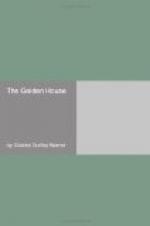“I feel a little feverish,” said the father. “You may give me five grains of quinine in whisky.”
“That’ll put you all right,” said the boy as he handed him the mixture. “It’s all the go now.”
It seemed to revive him, and he went out and walked on towards the heights. Somehow, seeing this boy, coming back to common life, perhaps the strong and unaccustomed stimulant, gave a new shade to his thoughts. He was safe. Presently he would be at the Retreat. He would rest, and then gird up his loins and face life again. The mood lasted for some time. And when the sense of physical weariness came back, that seemed to dull the acuteness of his spiritual torment. It was late when he reached the house and rang the night-bell. No one of the brothers was up except Father Monies, and it was he who came to the door.
“You! So late! Is anything the matter?”
“I needed to come,” the father said, simply, and he grasped the door-post, steadying himself as he came in.
“You look like a ghost.”
“Yes. I’m tired. I walked.”
“Walked? From Rivington Street?”
“Nearly. I felt like it.”
“It’s most imprudent. You dined first?”
“I wasn’t hungry.”
“But you must have something at once.” And Father Monies hurried away, heated some bouillon by a spirit-lamp, and brought it, with bread, and set it before his unexpected guest.
“There, eat that, and get to bed as soon as you can. It was great nonsense.”
And Father Damon obeyed. Indeed, he was too exhausted to talk.
XVII
Father Damon slept the sleep of exhaustion. In this for a time the mind joined in the lethargy of the body. But presently, as the vital currents were aroused, the mind began to play its fantastic tricks. He was a seminary student, he was ordained, he was taking his vows before the bishop, he was a robust and consecrated priest performing his first service, shining, it seemed to him, before the congregation in the purity of his separation from the world. How strong he felt. And then came perplexities, difficulties, interests, and conflicting passions in life that he had not suspected, good that looked like evil, and evil that had an alloy of virtue, and the way was confused. And then there was a vision of a sort of sister of charity working with him in the evil and the good, drawing near to him, and yet repelling him with a cold, scientific skepticism that chilled him like blasphemy; but so patient was she, so unconscious of self, that gradually he lost this feeling of repulsion and saw only the woman, that wonderful creation, tender, pitiful comrade, the other self. And then there was darkness and blindness, and he stood once more before his congregation, speaking words that sounded hollow, hearing responses that mocked him, stared at by accusing eyes that knew him for a hypocrite. And he rushed away and left them, hearing their laughter as he went, and so into the street—plainly it was Rivington Street—and faces that he knew had a smile and a sneer, and he heard comments as he passed “Hulloa, Father Damon, come in and have a drink.” “I say, Father Damon, I seen her going round into Grand Street.”




